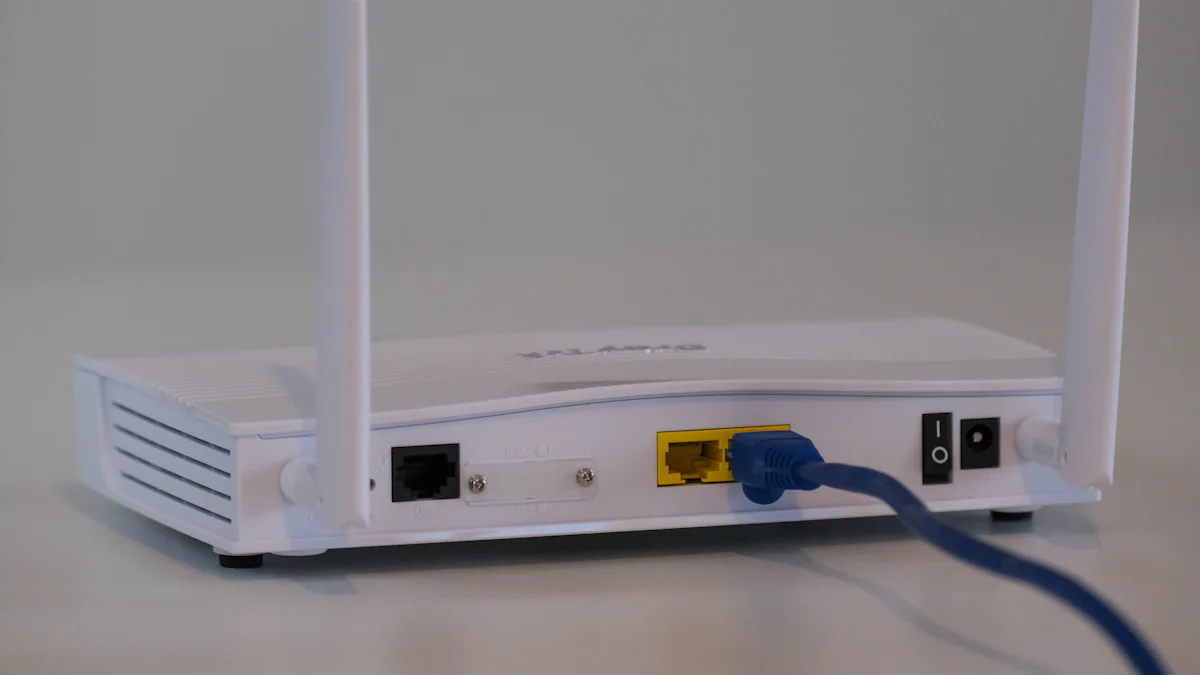
The 5G industrial router is revolutionizing how businesses handle communication in demanding environments. Its high-speed data transmission supports large-scale applications like intelligent manufacturing and smart cities. Unlike older technologies, it ensures reliable performance in critical scenarios, such as smart grids or UAV inspections, where stability and low latency are essential. You can rely on its robust design to maintain connectivity even in harsh conditions like extreme temperatures or high humidity. By integrating IoT devices seamlessly, this router empowers you to optimize operations and reduce costs, making it a cornerstone of modern industrial advancements.
The Role of 5G in Industrial Communication

Faster and More Reliable Connectivity
5G technology redefines industrial communication by delivering faster and more reliable connectivity. Unlike older networks, 5G offers ultra-reliable low latency communication (URLLC), ensuring seamless data exchange for mission-critical applications. This capability is vital for industries relying on real-time operations, such as manufacturing and energy. The high-speed data transmission of 5G enables predictive maintenance by processing large volumes of data instantly, reducing downtime and improving overall performance. Additionally, private 5G networks excel in high-density environments, maintaining stable connectivity even when numerous devices operate simultaneously. This reliability ensures your operations run smoothly, regardless of the complexity of your industrial setup.
Scalability for Expanding Business Needs
As your business grows, the scalability of 5G becomes a game-changer. A 5G industrial router can support up to 1 million connected devices within a 0.38-square-mile area, far surpassing the capacity of 4G networks. This capability allows you to integrate more IoT devices into your operations without compromising network performance. The infrastructure of 5G supports real-time communication between machines, enhancing productivity and enabling automation. With faster speeds and lower latency, you can streamline processes, improve collaboration, and reduce operational costs. Whether you are deploying sensors across a smart factory or managing a fleet of vehicles, 5G ensures your network can handle the demands of modern industrial environments.
Supporting 5G IoT Applications and Advanced Technologies
5G IoT technology unlocks the potential of advanced applications across various industries. In smart factories, 5G enables real-time communication between machines and sensors, facilitating predictive maintenance and improving production quality. For remote patient monitoring, wearable IoT devices transmit vital data over 5G networks, ensuring timely healthcare interventions. Intelligent transportation systems benefit from 5G by enabling real-time data sharing among vehicles, enhancing road safety and traffic management. Additionally, precision agriculture leverages IoT sensors to monitor crop conditions, optimizing farming practices. With its increased bandwidth and low latency, 5G data communication supports these innovations, empowering businesses to adopt cutting-edge solutions and stay ahead in competitive markets.
Key Benefits of 5G Industrial Routers for Businesses
Low Latency for Real-Time Operations
A 5G industrial router delivers low-latency connectivity, which is crucial for real-time operation in industrial environments. You can rely on reduced latency to ensure seamless communication between devices, enabling faster decision-making and improved efficiency. For example, in manufacturing, low latency allows robotic systems to respond instantly to commands, ensuring precision and safety. Similarly, in the industrial internet of things, real-time data exchange supports predictive maintenance, helping you avoid costly downtime. By leveraging 5G data communication, you can achieve unparalleled performance in applications where every millisecond counts.
High-Speed Data Transfer for Large-Scale Applications
The enhanced speed of 5G enables high-speed data transfer, making it ideal for large-scale industrial applications. A جهاز التوجيه الصناعي 5G 5G can handle massive amounts of data generated by IoT devices, ensuring smooth operations even in data-intensive environments. For instance, in smart factories, you can use 5G to transmit high-resolution video feeds for quality control or monitor production lines in real time. The increased bandwidth of 5G ensures that your network can support multiple devices simultaneously without compromising performance. This capability is essential for industries like logistics, where high-speed communication is critical for tracking shipments and managing supply chains efficiently.
Enhanced Connectivity in Remote or Harsh Environments
A 5G industrial CPE provides enhanced connectivity, even in remote or harsh environments. Whether you operate in extreme temperatures, high humidity, or isolated locations, this router ensures reliable communication. For example, in the energy sector, you can monitor remote infrastructure like pipelines or wind turbines using IoT sensors connected via 5G. The robust design of these routers ensures uninterrupted performance, allowing you to maintain operations without disruptions. With 5G, you can overcome the challenges of limited connectivity in remote areas, ensuring your business remains productive and competitive.
Improved Network Security and Reliability
A 5G industrial router offers advanced security features to protect your network and ensure reliable performance. In an era where cyber threats are increasingly sophisticated, these routers provide robust defenses to safeguard your industrial operations. By integrating cutting-edge technologies, they help you maintain secure and uninterrupted connectivity.
To protect data transmission, 5G routers employ strong encryption technologies like AES. This ensures that sensitive information remains secure during communication. Access control mechanisms further enhance security by restricting unauthorized access through robust authentication and authorization protocols. These features allow you to confidently manage your network, knowing that only authorized personnel can access critical systems.
Firewalls and intrusion detection systems (IDS) are essential components of 5G industrial CPE devices. Firewalls filter incoming and outgoing traffic, blocking malicious activities before they can harm your network. Meanwhile, IDS continuously monitor for suspicious behavior, enabling you to respond quickly to potential threats. These tools work together to create a multi-layered defense system that protects your operations from cyberattacks.
Regular software updates and patches are another critical feature of 5G routers. Manufacturers provide secure updates to address vulnerabilities and enhance system security. Secure boot and firmware integrity ensure that only trusted software loads during startup, preventing unauthorized modifications. These measures help you maintain the reliability of your network over time.
The reliability of 5G data communication also extends to remote environments. Whether you operate in isolated locations or harsh conditions, these routers deliver consistent performance while keeping your network secure. By leveraging these advanced security features, you can focus on optimizing your industrial processes without worrying about network vulnerabilities.
With a 5G industrial router, you gain not only high-speed connectivity but also the peace of mind that your network is protected against evolving threats. This combination of security and reliability makes it an indispensable tool for modern industrial operations.
Applications of 5G Industrial Routers in Business Operations

التصنيع
IoT Integration for Smart Factories
You can transform your manufacturing processes by integrating IoT devices with a جهاز التوجيه الصناعي 5G 5G. These routers enable seamless communication between machines, sensors, and robotics, creating a smart factory environment. With 5G’s high-speed and low-latency connectivity, you can automate operations, optimize workflows, and enhance productivity. The increased bandwidth of 5G supports the real-time exchange of large data volumes, ensuring smooth coordination across your production lines. This integration not only minimizes downtime but also improves product quality by enabling precise monitoring and control of manufacturing processes.
Real-Time Monitoring and Predictive Maintenance
A 5G industrial router empowers you to monitor your operations in real time. By leveraging IoT sensors, you can collect and analyze data instantly, identifying potential issues before they escalate. Predictive maintenance becomes a reality with 5G, as its low latency allows you to act on insights without delay. This reduces equipment failures and extends the lifespan of your machinery. For example, in a production facility, you can track performance metrics continuously, ensuring optimal efficiency and avoiding costly disruptions.
Logistics and Supply Chain
Fleet Management and Tracking
5G industrial routers revolutionize fleet management by providing real-time tracking and monitoring of vehicles. You can ensure timely deliveries and improve operational efficiency with high-speed data transmission. These routers enable live location updates, helping you predict and avoid delays. By integrating AI, you can optimize transportation routes and enhance vehicle-to-vehicle communication for automated transport. This level of connectivity ensures better visibility across your supply chain, leading to improved customer satisfaction.
Warehouse Automation
In warehouses, 5G technology supports automation by connecting IoT devices and robotics. A 5G industrial CPE ensures reliable communication between systems, enabling tasks like inventory management and order fulfillment to run smoothly. With increased bandwidth, you can handle the high data volumes generated by automated systems. This connectivity allows you to monitor inventory levels in real time, reducing errors and improving efficiency. By adopting 5G, you can streamline your warehouse operations and meet the demands of modern supply chains.
Energy and Utilities
Remote Monitoring of Infrastructure
5G industrial routers play a critical role in monitoring energy infrastructure. You can use these routers to collect real-time data from remote locations, such as pipelines or wind turbines. This ensures the efficient operation of your systems and reduces the risk of outages. The high-speed connectivity of 5G enables you to respond quickly to any issues, maintaining the reliability of your energy distribution network. By adopting a data-driven approach, you can improve the efficiency and sustainability of your operations.
Smart Grid Management
With 5G, you can revolutionize grid management by enabling real-time communication between devices. A 5G industrial router allows you to monitor energy consumption, adjust power loads, and balance supply and demand effectively. This technology supports the decentralization and decarbonization of energy systems, helping you adopt sustainable practices. By leveraging 5G’s capabilities, you can enhance the reliability and efficiency of your grid, ensuring uninterrupted service for your customers.
How 5G Routers Address Modern Industrial Challenges
Solving Network Congestion Issues
Network congestion can disrupt your operations, especially in environments with high device density. A 5G industrial router helps you overcome this challenge by offering increased bandwidth and advanced traffic management capabilities. Unlike older networks, 5G supports a significantly higher number of connected devices without compromising performance. This ensures smooth communication across your industrial setup, even during peak usage. For example, in a smart factory, you can connect hundreds of IoT devices simultaneously while maintaining stable data transmission. By adopting 5G, you can eliminate bottlenecks and ensure uninterrupted workflows.
Reducing Downtime and Ensuring Business Continuity
Downtime can lead to significant financial losses and operational inefficiencies. A 5G router minimizes this risk by providing ultra-reliable connectivity with low latency. This allows you to monitor and manage your systems in real time, reducing the likelihood of unexpected failures. For instance, in remote energy facilities, you can use 5G to collect and analyze data from critical infrastructure, enabling proactive maintenance. The robust design of industrial 5G routers ensures consistent performance, even in harsh conditions. By leveraging this technology, you can maintain business continuity and enhance operational resilience.
Enabling Scalability for Future Growth
As your business expands, your network must adapt to increasing demands. A 5G industrial router offers the scalability needed to support future growth. With the ability to connect up to one million devices per square kilometer, 5G ensures your network can handle the integration of new technologies and devices. This scalability is essential for industries adopting automation and IoT solutions. For example, in logistics, you can scale your operations by connecting additional sensors and tracking systems without overloading your network. By investing in 5G, you prepare your business for long-term success in a rapidly evolving industrial landscape.
Supporting High-Density Device Environments
Managing high-density device environments presents unique challenges for industrial operations. Traditional Wi-Fi networks often struggle to maintain performance in such scenarios. Coverage gaps frequently occur due to limited range, and the network’s inability to handle numerous simultaneous connections leads to congestion. These limitations hinder real-time communication, which is critical for modern industrial applications like automated manufacturing or remote monitoring.
5G technology provides a robust solution to these challenges. Its wider coverage ensures consistent connectivity across large industrial spaces, eliminating the coverage gaps common with Wi-Fi. The ability to support up to one million devices per square kilometer allows you to connect a vast number of IoT devices without compromising performance. This capability is essential for industries deploying smart sensors, robotics, and other connected technologies in high-density environments.
Low latency is another key advantage of 5G in these settings. Unlike Wi-Fi, which struggles to deliver the responsiveness required for real-time operations, 5G ensures seamless communication between devices. For example, in a smart factory, 5G enables instant data exchange between machines, improving efficiency and reducing downtime. Similarly, in logistics, it supports real-time tracking and coordination of fleets, ensuring smooth supply chain operations.
The high-speed data transfer of 5G further enhances its suitability for high-density environments. It allows you to process large volumes of data generated by connected devices quickly and efficiently. This capability is particularly valuable in applications like predictive maintenance, where timely insights can prevent costly equipment failures.
By adopting 5G, you can overcome the limitations of traditional networks and create a scalable, reliable infrastructure for your industrial operations. This technology empowers you to optimize workflows, enhance productivity, and stay competitive in an increasingly connected world.
Adopting a 5G industrial router positions your business for success in an increasingly connected world. These routers deliver unmatched speed, reliability, and scalability, enabling you to tackle modern industrial challenges with confidence. Businesses that have embraced this technology report higher efficiency in logistics, smarter manufacturing processes, and enhanced security in communications. With the growing integration of IoT and Industry 4.0, 5G routers are essential for connecting devices and managing large data volumes. Flexible pricing models now make this technology accessible, even for small and medium enterprises. By investing in 5G, you future-proof your operations and stay ahead in a competitive market.
الأسئلة الشائعة
What is a 5G industrial router?
A جهاز التوجيه الصناعي 5G 5G is a networking device designed for industrial environments. It provides high-speed, low-latency connectivity to support IoT devices, automation, and real-time operations. Its robust design ensures reliable performance in harsh conditions, making it essential for modern industries.
How does a 5G router improve business operations?
A 5G router enhances operations by enabling faster data transfer, real-time monitoring, and seamless IoT integration. It supports automation, predictive maintenance, and remote management, helping you optimize workflows, reduce downtime, and improve efficiency across various industries.
Can 5G industrial routers work in remote locations?
Yes, 5G industrial routers deliver reliable connectivity in remote or harsh environments. Their robust design ensures consistent performance in extreme temperatures, high humidity, or isolated areas, making them ideal for energy, utilities, and logistics industries.
Are 5G industrial routers secure?
5G industrial routers offer advanced security features like encryption, firewalls, and intrusion detection systems. These tools protect your network from cyber threats, ensuring safe and uninterrupted communication for critical industrial operations.
Why should small businesses consider 5G routers?
Small businesses benefit from 5G routers through scalable connectivity, improved efficiency, and cost savings. Flexible pricing models make this technology accessible, enabling you to adopt IoT solutions, automate processes, and stay competitive in a rapidly evolving market.